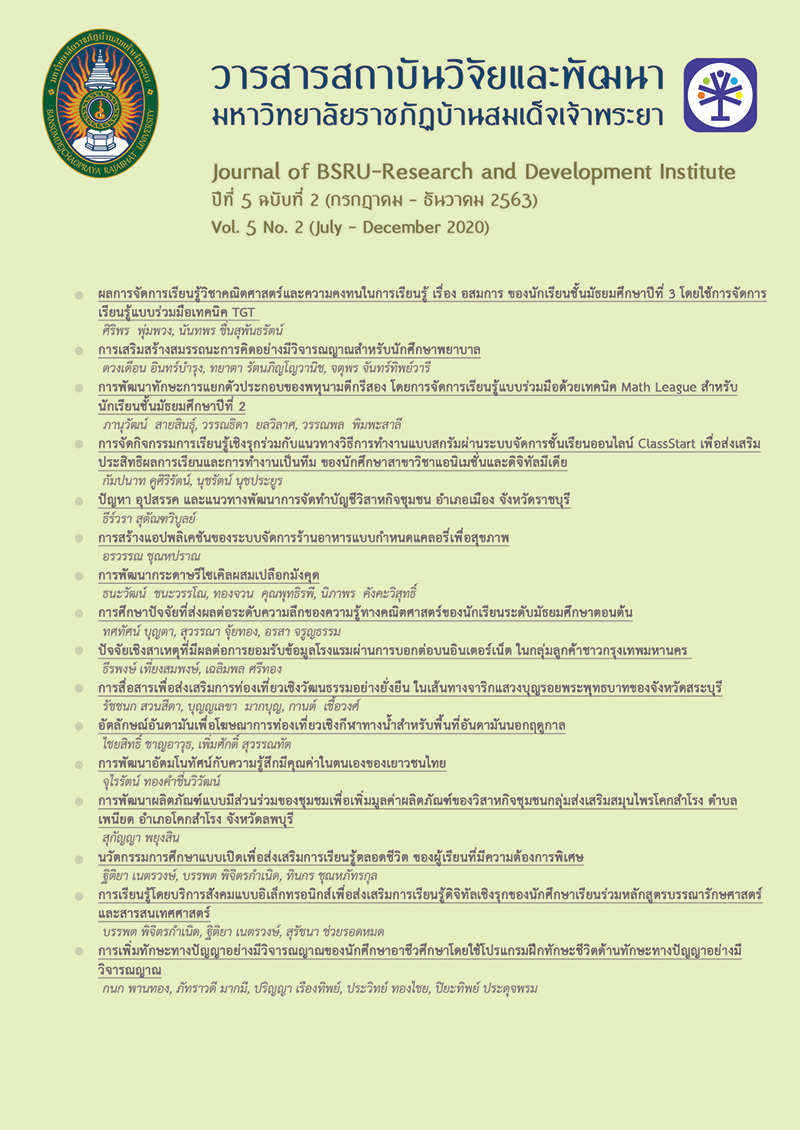ปัจจัยเชิงสาเหตุที่มีผลต่อการยอมรับข้อมูลโรงแรมผ่านการบอกต่อบนอินเตอร์เน็ต ในกลุ่มลูกค้าชาวกรุงเทพมหานคร
คำสำคัญ:
การบอกต่อบนอินเตอร์เน็ต; การสื่อสารการตลาด; การตลาดออนไลน์; สื่อสังคมบทคัดย่อ
การวิจัยในครั้งนี้มีวัตถุประสงค์เพื่อสร้างและทดสอบโมเดลสมการโครงสร้างของปัจจัยเชิงสาเหตุที่มีผลต่อการยอมรับข้อมูลโรงแรมผ่านการบอกต่อบนอินเตอร์เน็ตของกลุ่มลูกค้าชาวกรุงเทพมหานคร ซึ่งการบอกต่อบนอินเตอร์เน็ต (eWOM) เป็นการสื่อสารทางการตลาดที่มีความสำคัญในปัจจุบัน ซึ่งทำให้เกิดการแลกเปลี่ยนความคิดเห็นเกี่ยวกับสินค้าหรือบริการที่ง่าย สะดวก และรวดเร็ว หากธุรกิจพัฒนาช่องทางออนไลน์เพิ่มขึ้นย่อมใช้โต้ตอบกับลูกค้าได้อย่างมีประสิทธิภาพ ซึ่งจะนำไปสู่ความผูกพันของลูกค้าออนไลน์และความภักดีที่สูงขึ้นได้ โดยเก็บรวบรวมข้อมูลด้วยแบบสอบถามที่มีค่าความเชื่อมั่นของครอนบัคอยู่ระหว่าง 0.800 - 0.876 ใช้วิธีการสุ่มแบบหลายขั้นตอน จากกลุ่มตัวอย่างลูกค้าชาวกรุงเทพมหานคร จำนวน 400 คน วิเคราะห์ข้อมูลด้วยโปรแกรมลิสเรล ผลการวิจัยพบว่า โมเดลที่สร้างขึ้นมีความสอดคล้องกับข้อมูลเชิงประจักษ์ในระดับดีมาก หลังจากที่ปรับโมเดล ซึ่งกลุ่มปัจจัยเชิงสาเหตุในโมเดลสามารถอธิบายความแปรปรวนของการยอมรับข้อมูลเกี่ยวกับโรงแรมที่มีการบอกต่อบนอินเตอร์เน็ตได้ร้อยละ 91 โดยการยอมรับข้อมูลโรงแรมผ่านการบอกต่อบนอินเตอร์เน็ต (AeWOM) ได้รับอิทธิพลทางตรงจากทัศนคติ (ATT) มากที่สุด รองลงมาคือ ข้อมูลที่เกี่ยวข้อง (IR) และการรับรู้ประโยชน์ (PU) ตามลำดับ นอกจากนี้ การยอมรับข้อมูลโรงแรมผ่านการบอกต่อบนอินเตอร์เน็ต ยังได้รับอิทธิพลทางอ้อมจากการประเมินผลิตภัณฑ์ (PR) มากที่สุด รองลงมาคือ การรับรู้ประโยชน์ (PU) และการรับรู้ความน่าเชื่อถือ (PC) ตามลำดับ ดังนั้น การส่งเสริมการยอมรับข้อมูลลักษณะนี้ต้องทำความเข้าลูกค้าอย่างลึกซึ้ง แล้วนำไปสู่การสร้างการตลาดเชิงเนื้อหาที่เหมาะสม การนำข้อมูลมหัตมาวิเคราะห์เพื่อกำหนดกิจกรรมการตลาด รวมถึงต้องมีการโต้ตอบปฏิสัมพันธ์กับลูกค้าอย่างต่อเนื่อง เพื่อให้การบอกต่อบนอินเตอร์เน็ตเป็นปัจจุบันอยู่เสมอ
Downloads
เอกสารอ้างอิง
กรมการปกครอง. (2562). บริการข้อมูลสถิติ. Available from: http://stat.dopa.go.th/stat/statnew/upstat_age_disp.php
ชาญฤทธิ์ คงธนารัตน์, และ ณัฐพล อัสสะรัตน์. (2560). ปัจจัยที่มีผลกระทบต่อการรับรู้ความน่าเชื่อถือของการสื่อสารแบบปากต่อปากของร้านอาหารบนเฟซบุ๊ก. สงขลานครินทร์: ฉบับสังคมศาสตร์และมนุษยศาสตร์.
ประชาชาติธุรกิจ. (2562). เปิดกลยุทธ์ 3 ยักษ์ OTA โหมบุกตลาด “ท่องเที่ยวไทย”. Available from: https://www.prachachat.net/tourism/news-273386
ปิยะกมล โตสัมพันธ์ และธีรพงษ์ เที่ยงสมพงษ์. (2563). ตัวแบบเชิงสาเหตุของความภักดีของลูกค้าและความตั้งใจที่จะใช้บริการซ้ำที่ศูนย์บริการรถยนต์ในประเทศไทย. รายงานการประชุมวิชาการระดับชาติในความร่วมมือ 5 สถาบัน ประจำปี 2563 “BUSINESS ACROSS CRISIS”. มหาวิทยาลัยศรีนครินทรวิโรฒ, กรุงเทพฯ. 130-148.
ภัทราวดี วงศ์สุเมธ. (2556). ปัจจัยที่มีอิทธิพลต่อการยอมรับและการใช้งานระบบการเรียนผ่านเว็บ. วารสารนักบริหาร, 33 (3), 3-10.
Che, Y., Xiaorong, F., Bin, Z., Qinghong, X., & Liuli, X. (2011, June). Impact of Quantity and Timeliness of EWOM Information on Consumer’s Online Purchase Intention under C2C Environment. Southwestern University of Finance and Economics.
Department of Provincial Administration. (2019). Statistical Information Service. Available from: http://stat.dopa.go.th/stat/statnew/upstat_age_disp.php [In Thai].
Diamantopoulos, A. & Siguaw, J. A., (2000). Introduction to LISREL: A guide for the uninitiated. SAGE Publications.
Equinix, (2016, December 31). Retrieved from: http://investor.equinix.com/news-releases/news-release-details/equinixs-2016-industry-predictions-more-interconnection-more
George, D., & Mallery, M. (2010). SPSS for Windows Step by Step: A Simple Guide and Reference, 17.0 update (10a ed.), Pearson.
Hair, J., Black, W., Babin, B., & Anderson, R. (2010). Multivariate data analysis (7th ed.). Prentice-Hall.
Hur, J. (2016). Understanding positive electronic word-of-mouth intention: a conceptual model for hotels. (Doctoral dissertation), Purdue University West Lafayette.
Jia, X. (2016). How e-wom influences consumer behavior in an omni-channel retailer environment: a brand attitude moderated model. (Master Thesis), Kent State University.
Kao, C. B., & Lowinger, R. (2015). Psychological help-seeking among Latin American immigrants in Canada: Testing a culturally expanded model of the Theory of Reasoned Action using path analysis. International Journal for the Advancement of Counselling, 37(2), 179-197.
Khongthanarat, C. & Assarut, N. (2017). Factors Affecting eWom Credibility of Restaurants on Facebook. Songklanakarin: Journal of Social Sciences and Humanities. 23(2), 145-198. [In Thai].
Prachachat. (2019). “OTA Strategy for Thai tourism market entry”. Available from: https://www.prachachat.net/tourism/news-273386[In Thai].
Stripling, G. D. (2017). An empirical assessment of energy management information system success Using structural equation modeling. (Doctoral Dissertation), Nova Southeastern University, Available at https://nsuworks.nova.edu/gscis_etd/1019/
Teangsompong, T. & Sirisunhirun, S. (2018). Multi-level structural equation modeling for city development based on the expectations of the local population in a special border economic zone in Western Thailand. Kasetsart Journal of Social Sciences, 39(3), 534-541.
Tosampan, P. & Teangsompong, T. (2020). Causal Model of Customer’s Loyalty and Service Repurchase Intention for Using Car Service Centers in Thailand. Proceedings book of 5+BAs National Conference 2020 “BUSINESS ACROSS CRISIS”. Srinakharinwirot University, 130-148. [In Thai].
Tran, G. A., (2014). Investigating e-service scape, trust, e-wom, and customer loyalty (Doctoral dissertation), University of North Texas.
Vongsumet, P. (2013). Factors Influencing the Adoption of Web-Based Learning System. Executive Journal, 33 (3), 3-10. [In Thai].
Wu, M. (2018). Customers’ perceptions of service quality, using an online reservation system, and online reviews affecting intention to use the system to book a hotel room. (Doctoral dissertation), Iowa State University Ames.
Watts, S. (1998). Adoption of mediated knowledge in organizations: source credibility and information usefulness (Doctoral dissertation), Boston University.
Zou, W. (2019). An integrated theoretical model of E-WOM adoption - A case in hotel industry. (Doctoral dissertation), Oklahoma State University.
เผยแพร่แล้ว
ฉบับ
ประเภทบทความ
สัญญาอนุญาต
บทความ ข้อความ ภาพประกอบ และตารางประกอบที่ลงพิมพ์ในวารสารเป็นความคิดเห็นส่วนตัวของผู้นิพนธ์ กองบรรณาธิการไม่จำเป็นต้องเห็นตามเสมอไป และไม่มีส่วนรับผิดชอบใดๆ ถือเป็นความรับผิดชอบของผู้นิพนธ์เพียงผู้เดียว






